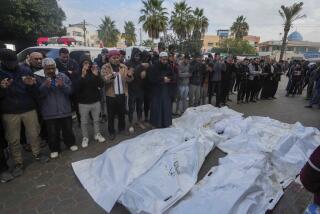Morocco, Rebels Reach Western Sahara Accord
- Share via
GENEVA — The Moroccan government and Polisario Front guerrillas gave conditional approval Tuesday to U.N. peace proposals for the Western Sahara, raising the prospect of an end to almost 13 years of war in the desert territory.
Francois Giuliani, spokesman for U.N. Secretary General Javier Perez de Cuellar, said the two sides had accepted a plan calling for a cease-fire followed by a referendum on self-determination in the former Spanish colony.
Diplomatic sources said the main obstacle to a settlement now appears to be the size of the Moroccan military and administrative presence that would be allowed to stay in the remote, sparsely populated territory during the U.N.-supervised referendum.
Annexed in 1975
King Hassan II of Morocco annexed the phosphate-rich Western Sahara when Spain withdrew in 1975. Morocco’s troop strength there is estimated at about 150,000.
Polisario supporters, backed by Algeria, proclaimed a Saharan Arab Democratic Republic in the Western Sahara in 1976, and 70 countries have formally recognized the republic.
Giuliani made it clear that Moroccan and Polisario envoys had expressed some reservations about the peace plan when Perez de Cuellar received them separately at the U.N. European headquarters in Geneva on Tuesday.
Giuliani did not disclose the precise contents of the peace plan, submitted to the two sides Aug. 11 but said Perez de Cuellar hopes that it will be implemented before the end of the year.
“There is agreement in principle on our side to start implementing his proposals,” Moroccan Foreign Minister Abdellatif Filali told reporters, adding his country’s hope that a referendum can take place reasonably soon.
The Polisario’s second in command, Bechir Mustafa, said that the conflict has now entered a new phase but that some difficulties remain. He said a large number of Moroccan troops must be pulled out and an interim international administration installed as part of the peace plan.
Another issue in the past has been the question of who would be entitled to vote in the referendum.
Both sides said Tuesday that they accepted the results of a 1974 Spanish census that put the territory’s indigenous population at a little more than 73,000 when Spain pulled out. It has since been swollen by thousands of Moroccan settlers.
More to Read
Sign up for Essential California
The most important California stories and recommendations in your inbox every morning.
You may occasionally receive promotional content from the Los Angeles Times.










